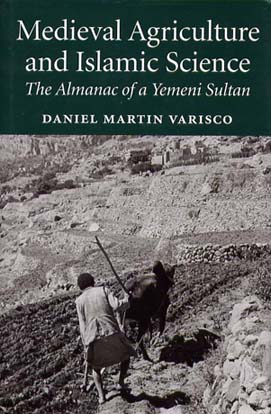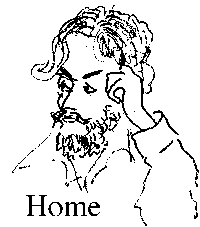Anthropologist/Historian
e-mail: dmvarisco@gmail.com
online
curriculum vitae
media
page
blog
Updated 10/22
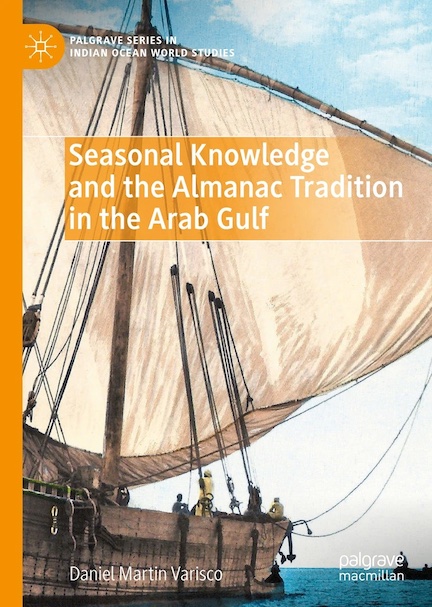 |
Seasonal Knowledge and the Almanac
Tradition in the Arab Gulf Ordering Information https://link.springer.com/book/10.1007/978-3-030-95771-1 This book is the first in English to survey indigenous knowledge of seasonal, astronomical, and agricultural information in Arab Gulf almanacs. It provides an extensive analysis of the traditional information available, based on local almanacs, Arabic texts and poetry by Gulf individuals, ethnographic interviews, and online forums. A major feature of the book is tracing the history of terms and concepts in the local seasonal knowledge of the Gulf, including an important genre about weather stars, stemming back to the ninth century CE. Also covered are pearl diving, fishing, seafaring, and pastoral activities. This book will be of interest to scholars who study the entire Arab region, since much of the lore was shared and continues through the present. It will also be of value to scholars who work on the Indian Ocean and Red Sea Trade Network, as well as the history of folk astronomy in the Arab World.
|
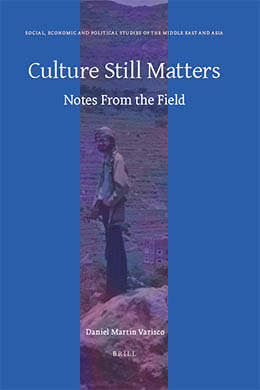 |
Ordering Information https://brill.com/abstract/title/38796. Culture Still
Matters: Notes from the Field is on the relationship
between ethnographic fieldwork and the culture concept
in the ongoing debate over the future of anthropology,
drawing on the history of both concepts. Despite being
the major social science that offers a methodology and
tools to understand diverse cultures worldwide, scholars
within and outside anthropology have attacked this field
for all manner of sins, including fostering colonialism
and essentializing others. This book revitalizes constructive
debate of this vibrant field's history, methods and contributions,
drawing on the author's ethnographic experience in Yemen.
It covers complicated theoretical concepts about culture
and their critiques in readable prose, accessible to students
and interested social scientists in other fields.
With forewords from Bryan S. Turner and Anouar Majid. |
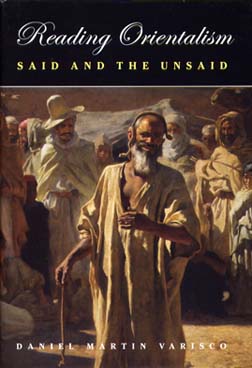 |
Reading Orientalism:
Said and the Unsaid. Ordering Information http://www.washington.edu/uwpress/search/books/VARRO2.html
"There is a lot of commentary available on Edward Said and
Orientalism, but nothing like this. Varisco has compiled a comprehensive,
critical overview of nearly everything that has been said on the topic.
The notes and bibliography alone are a significant contribution to
scholarship on Said and his work, but Varisco also uses his vast wealth
of sources as the basis for a devastating critique of Said's methodology
and conclusions - a critique that fairly acknowledges the beneficial
consequences of Orientalism and the issues it raises." Reviews: Robert Irwin, TLS, May 7, 2008; Anouar Majid, American Literary History, 21(3):633-646, 2009; Siegfried Kohlhammer, Merkur (Deutsches Zeitschrift f. europäisches Denken), 717:151-164, 2009; Carl Olson, The Review of Politics, 71(1):146-149, 2009; A. N. Isstaif, Journal of Islamic Studies 20(2):304-306, 2009; Khalid Haji, Al-Jazeera (aljazeera.net) 4/12/2008; Matthew Abraham, Logos, 8(2), 2009. |
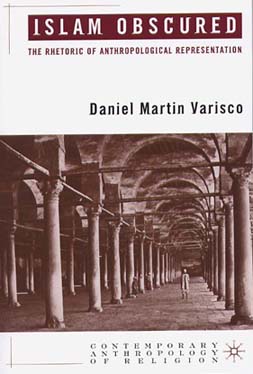 |
Islam Obscured: The Rhetoric of Anthropological Representation. Society for the Anthropology of Religion Series. New York: Palgrave, 2005 Ordering Information http://www.palgrave-usa.com/catalog/product.aspx?isbn=1403967725 . "In Islam
Obscured Daniel Varisco offers a brilliant and nuanced
analysis of four influential anthropologists against the backdrop
of older, less field-based ethnographies of Muslim societies. His
penetrating critiques of the influential works of Clifford Geertz,
Ernest Gellner, Fatima Mernissi, and Akbar Ahmed lead to a probing
discussion of the challenges facing the anthropology of Islam in
the twenty-first century." Reviews: Timothy Daniels, American Journal of Islamic Social Sciences, 25(2):123-125, Spring, 2008; Muhammad Talib, Journal of Islamic Studies, 18(2):254-257, 2007. |
| The
Manuscript of al-Malik al-Afdal: al-'Abbas b. 'Ali Dawud b. Yusuf
b. 'Umar b. 'Ali Ibn Rasul (d. 778/1377): A Medieval Arabic Anthology
from the Yemen. (Editor, with G. R.
Smith). : http://www.arisandphillips.com/Smith.html
|
Medieval
Folk Astronomy and Agriculture in Arabia and the Yemen. https://www.ashgate.com/shopping/title.asp?key1 =&key2=&orig=results&isbn=0%2086078%20651%20X
|
Medieval Agriculture
and Islamic Science. The Almanac of a Yemeni Sultan [Arabic
edition, English translation, commentary]. Seattle: University of
Washington Press, 1994. xv, 349 pp.
“This is a superb book. The author, an anthropologist by training, has all the right qualities for the task at hand: he has spent time in the field and knows Yemenis and their everyday life extremely well; he also has a first-class knowledge of Arabic, both spoken and literary, including an evident competence to handle difficult medieval MS materials; moreover, he has a real feeling for history and everything is placed in its appropriate historical context.” G. Rex Smith, Journal of the Royal Asiatic Society, 1995
|
“Varisco schöpft für diese Untersuchung einer spröden Textgattung aus profunder Kenntnis der Materie, die er nicht nur durch intensive Quellenstudien, sondern auch durch lange Forschungsaufenthalte im Jemen erworben hat.” Silke Ackerman, Historische Zeitschrift, 1996
|
